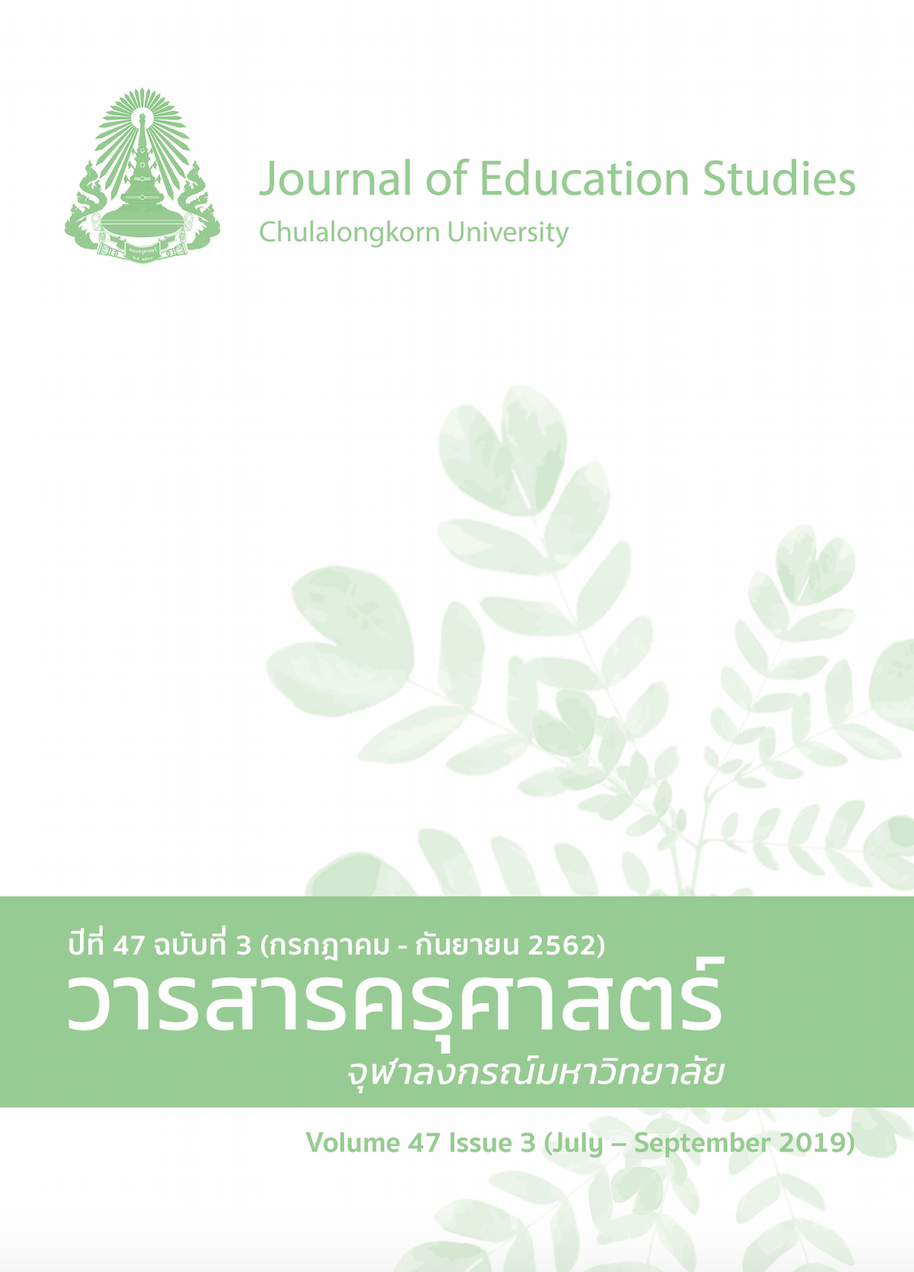Proposed for Policy Trends in the Production of Primary School Teachers for the Enhancement of Students Quality
Keywords:
POLICY, PRODUCTION OF PRIMARY SCHOOL TEACHERS, TRENDS, TEACHER POLICYAbstract
The objective of this research were to 1) study the policy concept of producing primary school teachers of the world’s top successful countries in education, and 2) develop a policy of preparation primary school teacher for the enhancement of students quality. The methodology used in this research is the Ethnographic Delphi Futures Research (EDFR) with the document research on policies and strategies of 11 nations which are successful on educational management. The research instruments were in-depth interviews and questionnaires. 50 experts in education of Thailand had been interviewed about recommendations for policy makers to produce primary school teachers. The data were analysed using frequency, percentage, median, and interquartile range. The results indicated that the concept and policy trends in the production of primary school teachers consist of 6 aspects: 1) the standards for the admission system; 2) the specific curriculum to produce primary school teachers; 3) the teacher practicum process; 4) the standard of the teacher institutions; 5) the requirements for the teacher license; and 6) the participation of the organizations.
References
ภาษาไทย
ครูผู้ช่วย ปี 56 สมัครสอบ 8.4 หมื่น ผ่าน 5,074 คน. (8 กรกฎาคม 2556). สยามรัฐออนไลน์. สืบค้นจาก https://www.siamrath.co.th
จุมพล พูลภัทรชีวิน. (2540). การวิจัยอนาคตแบบ EDFR ในแบบแผนและเครื่องมือการวิจัยทางการศึกษา. กรุงเทพฯ: ศูนย์หนังสือจุฬาลงกรณ์มหาวิทยาลัย.
เจอราลด์ ดี โกรว์ฟ. การทำให้เกิดการเปลี่ยนแปลงทางการศึกษาอย่างยั่งยืนในประเทศไทย มุมมองจากภายในสู่ภายนอกในเรื่องการสร้างชาติ ภูมิภาคภิวัตน์ และโลกาภิวัตน์. กรุงเทพฯ: วัชรินทร์ พี.พี.
ดิเรก พรสีมา. (2546). การพัฒนาวิชาชีพครู. สืบค้นจาก https://www.onec.go.th/Act/627/
เบลลันกา, เจ. และ แบรนด์, อาร์. (2554). การศึกษาเพื่อศตวรรษที่ 21. [21st Century Skills: Rethinking How Students Learn] (วรพจน์ วงศ์กิจรุ่งเรือง และ อธิป จิตตฤกษ์, ผู้แปล). กรุงเทพฯ: โอเพ่น เวิลด์ส.
พฤทธิ์ ศิริบรรณพิทักษ์ และ คณะ. (2549). รายงานการวิจัยเรื่องคุณวุฒิของครุและคุณภาพงานครู. กรุงเทพฯ: คณะครุศาสตร์ จุฬาลงกรณ์มหาวิทยาลัย.
ไพฑูรย์ สินลารัตน์ และ คณะ. (2554). การพัฒนาคุณภาพการศึกษาไทยสู่สากล: เปรียบเทียบประเทศจีน เวียดนาม ญี่ปุ่น เกาหลี เยอรมัน ฟินแลนด์ และประเทศไทย (พิมพ์ครั้งที่ 3). กรุงเทพฯ: โรงพิมพ์แห่งจุฬาลงกรณ์มหาวิทยาลัย.
ภาวิช ทองโรจน์. (2551, 9 พฤศจิกายน). 10 อาการที่ต้องผ่าตัดใหญ่การศึกษาไทย: คุณภาพตกต่ำปัญหาโครงสร้างครู. มติชนรายวัน, 7.
วิทยากร เชียงกูล. (2553). สภาวะการศึกษาไทย ปี 2552/2553: จะปฏิรูปการศึกษาให้ได้ผลจริงได้อย่างไร. กรุงเทพฯ: วี.ที.ซี. คอมมิวนิเคชั่น.
วีระยุทธ มณีโคตร. (2555). สพฐ.สรุปข้อมูลการเรียกบรรจุครูผู้ช่วยบัญชีปี 55 วันที่ 24 สิงหาคม 2555. สืบค้นจาก https://kroothaiban.blogspot.com/2012/08/55-24-2555.html
สำนักงานคณะกรรมการการศึกษาแห่งชาติ. (2545). รายงานฉบับสังเคราะห์: จากวิกฤตสู่โอกาสสิ่งที่ยังท้าทายการปฏิรูปการศึกษาของไทย. กรุงเทพฯ: สำนักงานคณะกรรมการการศึกษาแห่งชาติ.
สำนักงานเลขาธิการสภาการศึกษา [สกศ.]. (2553). รายงานการวิจัยเรื่อง การวิจัยและพัฒนานโยบายการ พัฒนาครูและบุคลากรทางการศึกษา. กรุงเทพฯ: พริกหวานกราฟฟิค.
หลี่ หลานชิง. (2552). การศึกษาเพื่อประชากร 1,300 ล้าน. (เนาวรัตน์ แย้มแสงสังข์, ผู้แปล). กรุงเทพฯ: ไอกรุ๊ป เพรส.
ภาษาอังกฤษ
Atagi, R. (2002, May). The thailand educational reform project: School reform policy. Paper presented at the ADB and ONEC, Bangkok, Kingdom of Thailand.
Barber, M. (2007). How the world’s best-performing school systems come out on top. London, UK: McKinsey & Company.
Bellanca, J., & Brandt, R. (2011). Comparing frameworks for 21st century skills: Rethinking how students learn. Bloomington: Solution Tree Press.
Glatthorn, A. A., Jones, B. K., & Bullock, A. A. (2006). Developing highly qualified teachers. Thousand Oaks, CA: Corwin.
Goh, C. B., & Gopinathan, S. (2007). The development of education in Singapore since 1965. Washington, DC: The World Bank.
Strain, L. B. (2007). Documenting characteristics of highly qualified teachers. Retrieved from https://forumonpublicpolicy.com/archievesum07/starain.pdf
Strain, L. B. (2007). Documenting characteristics of highly qualified teachers. Retrieved from https://eric.ed.gov/?id= EJ1099087
Textor, R. (1990). The middle path for the future of Thailand: Technology in harmony with culture and environment. Bangkok: Thai Watana Panich.
The National council on Teacher Quality. (2012). 2012 State teacher policy yearbook: Improving teacher preparation national summary. Retrieved from https://www.nctq.org/dmsView/2012_State_Teacher_Policy_Yearbook_Executive_Summary_pdf




